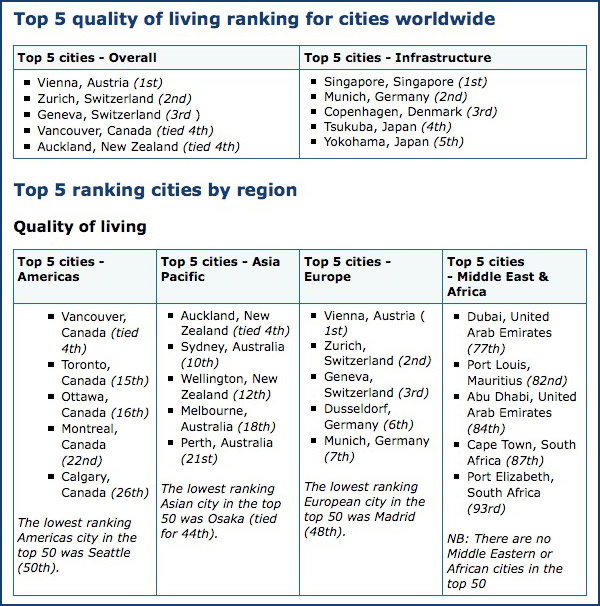Mercer Consulting, the world’s largest human resource firm specialising in investments and outsourcing, prepared their 2009 survey of the world’s most livable cities, always a favourite among statistics fanatics who enjoy seeing where they stand relative to everyone else. In the current setting where our cities are becoming more and more alike and many of us are more and more able to act as agents of cultural exportation and outsourced production, surveys such as these are immediate markers of the mass human structuralisation, where according to real variables we can judge the quality of our lives.
The downside of this cosmopolitanesque proposition is that it establishes one standard for what “high quality” should mean and how we can hierarchically rank ourselves next to everyone else. This is useful, of course, to the sorts of companies to which Mercer’s research is tailored, but we should be careful not to confuse the criteria of “global firm” with that of the richness of daily life at ground level.
To be able to accurately calculate their findings, Mercer must be able to find horizontally equivalent categories of comparison. These include: consumer goods, economic environment, housing, medical and health considerations, natural environment, political and social environment, public services and transport, recreation, schools and education and socio-cultural environment. What does this mean, exactly? That we should be buying the same types of goods, that we can only be worthy if we are wealthy and that we should all be receiving the same type of education? Can our socio-political freedoms be counted in numbers of legislation when techno-media influences are deeply linked to certain underlying economic/political agendas?
Thinking a bit about the cosmopolitan geographies that Bea is building for her research, I wonder how the real diversity and livelihood of a city can be calculated. The local seems to be neglected in a large-scale survey such as Mercer’s, but like Butler asks, what are the useful outcomes of contingency “whereby the terms that constitute us are simultaneously deployed, deconstructed, and reiterated”? And like the example of the interviewee who replied that eating at fast food chains such as KFC and McDonald’s have been absorbed enough into contemporary Chinese practices so as to be considered a part of Chinese culture (no longer merely Western), how we distinguish the local from the global is not always so clear. Standardisation in terms of technologies, market diversity, public services and healthcare can be useful and of course in certain terms be beneficial to a greater good. But these standards should hopefully also allow for creativity, recontextualisation and sustainable practices. Western neo-liberal hegemony (with Mercer’s survey as an example of that) has been cunning thus far with its abilities, but we are coming to realise that it cannot and should not be so easily adopted as universal standard.
After that, well…still stuck. Bea, let’s keep going…


 时间 posted on: 26 January 2010 |
时间 posted on: 26 January 2010 |  发布者 author:
发布者 author: 
 分类 filed under:
分类 filed under: 